How masks became an integral part of life Spain
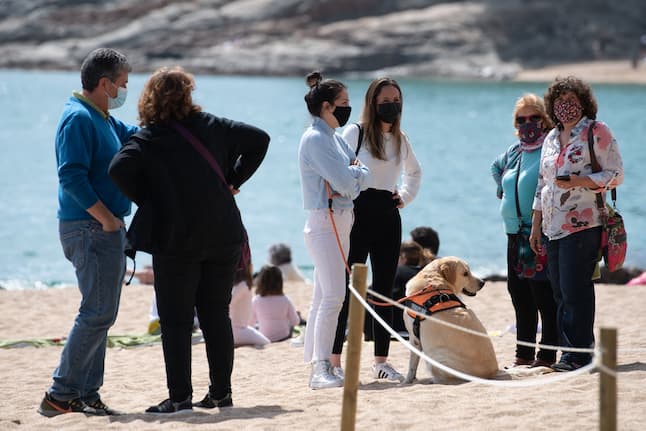
Now that masks are for the most part no longer mandatory in Spain, we take a look back at how they've shaped Spaniards' habits, their budgets and even their wardrobes.
Since Wednesday April 20th, face masks are no longer mandatory in most indoor public spaces in Spain.
It's a surreal feeling of personal choice for people who live in Spain after 700 days of mandatory face coverings.
Masks have formed part of life in the country since the very beginning of the Covid-19 pandemic, and two years on, they've become an integral part of life in Spain.
READ ALSO: Is Spain ready to get rid of masks indoors?
They were once the most sought-after product in Spain
At the start of the pandemic, masks became the most sought-after products in the country and they were almost impossible to get your hands on. In February 2020, even before the first deaths from Covid-19 demand in pharmacies multiplied by 8,000 and those who searched online found the surgical ones brought from China would take months to arrive. People had to make do with bandanas and rudimentary homemade ones made from cloth material.
Businesses popped up online or through hearsay which saw money-hungry sellers pricing a single mask at €7 or higher.
Masks became so sought-after that people even started producing fake ones. At the beginning of 2021, Spanish police said they seized around four million counterfeit medical-grade face masks at a hotel during a raid in Madrid.
Overall, the average person in Spain has spent €700 on face masks in the last two years, and those who've opted for FFP2 ones, have coughed up €1,515 on average, according to Spanish consumer watchdog OCU.
They’ve changed the way Spaniards greet each other
One of the biggest ways in which masks changed Spanish culture was the way many people started greeting each other. Kissing on each cheek and hugging no longer became socially acceptable for many and masks acted as barriers between people. Spaniards resorted to bumping elbows, simple waves or other ways of greeting instead. People who like their personal space to be respected are now calling for the two-kiss tradition to not return.
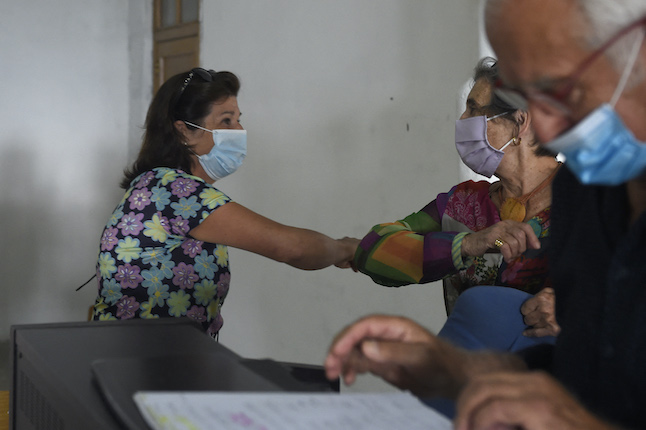
Spaniards greet each other by bumping elbows, instead of kissing. Photo: MIGUEL RIOPA / AFP
They’ve become the standout litter in Spanish streets
Cigarette butts and cans may have been the most common type of litter in Spanish streets a couple of years ago, but nowadays it's masks that ungracefully decorate sidewalks in the country. According to the European Agency for the Environment (AEMA), the environmental and climatic impacts of the increase in disposable masks have been huge. In 2020 alone, at least 1.56 billion masks ended up in the sea.
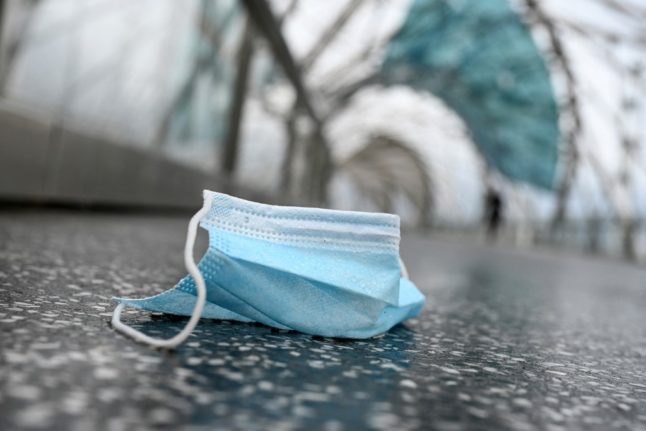
According to Spanish NGO Fundación Ecomar, millions of face masks have ended up in the sea. Photo: Roslan RAHMAN/AFP
Forgetting your mask at home became a real pain
Until recently if you accidentally left home without a mask, it could end up being pretty much impossible to do anything. You weren’t allowed on public transport, you couldn't walk into restaurants or shops, or attend any events. In fact, remembering a mask became just as important as making sure sure you have your wallet, keys or mobile when you left the house.
They became a fashion accessory
Masks even became a fashion symbol in Spain, with many ditching the plain blue or black medical masks and opting for material ones emblazoned with funky designs and images. Masks became decorated with everything from cartoon characters for kids to sequins for people heading out on the town and even horror masks with scary clown or Joker faces.
The creative zeal of businesses was so relentless that Spanish authorities had to toughen requirements for the manufacture and sale of face masks, as many masks weren't doing the actual job they were meant for.
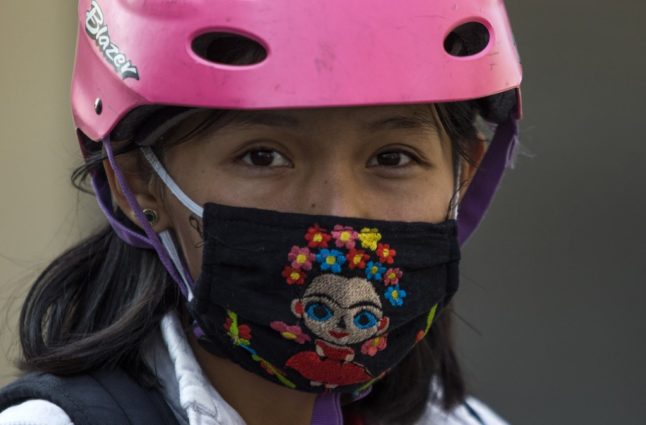
Face masks became a fashion symbol. Photo: Claudio CRUZ / AFP
They became political and social labels
Not only did masks serve as a fashion statement, they became a political one too. Many across Spain decided to reflect their political affiliations right across their face coverings. Right-wing nationalists wore military green ones with the Spanish flag, while Catalan independentistas (those who want independence) wore ones with the Senyera Catalan flag.
Spaniards also began to label themselves as mask wearers on social media, writing (masked) in brackets after the name. This was particularly common on social platforms such as MeetUp, where people would organise activities to meet new friends.
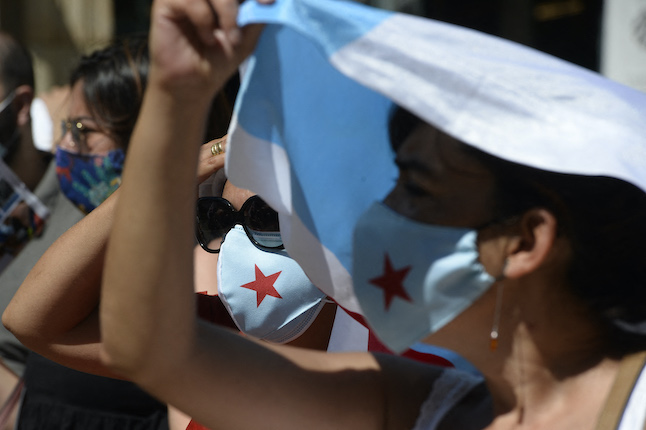
Two women wearing face masks with the Galician nationalist flag take part in a demonstration. Photo: MIGUEL RIOPA / AFP
They became a way of judging others’ behaviour
Throughout the pandemic, Spaniards have - often unknowingly - judged others based on whether they were wearing a mask or not, or even if they were wearing one correctly. For many, not wearing one or having the nose outside of the mask was akin to being socially irresponsible.
When infection rates dropped, TV reports would blame young people and their maskless partying for the rise in cases. In the worst cases, fights broke out on public transport between passengers who reprimanded others for not wearing a mask.
Not wearing one became a crime
Throughout Spain, during the two states of alarm more than 1.3 million fines were imposed and around half of these were for not wearing a mask. The fines ranged between €100 and €6,000. There were also reports of some of Spanish society's most rebellious individuals being arrested for refusing to mask up.
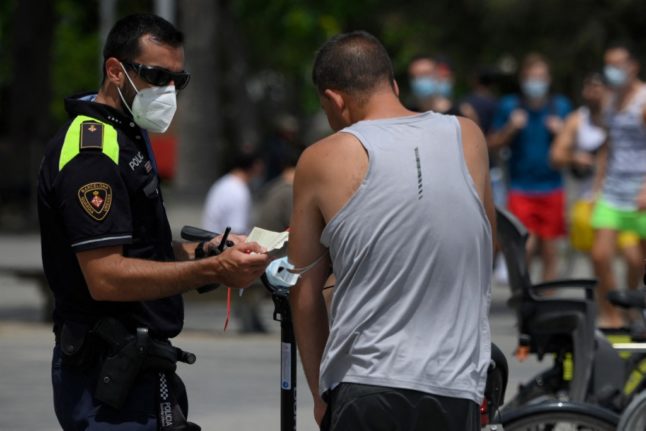
A municipal police officer on patrol for face mask warnings gives a fine to a e-scooter rider without a mask on in 2020. (Photo by LLUIS GENE / AFP)
In the summer of 2020, the Andalusian Government even hired 3,000 'informants' to travel its 1,000 kilometres of coastline and denounce bathers who were not wearing a mask, even when they were alone.
They caused young Spaniards to have less face-to-face contact
After exactly 700 days of having to wear a mask indoors in Spain, many young children have spent more than half their lives looking at and interacting with people wearing masks.
According to the hospital group HM Hospitales, the use of masks has caused a 20 percent increase in consultations for children’s speech problems in Spain. Mask rules have also seen an increase in síndrome de la cara vacía or mask-fishing among teens – a phobia or feeling of anxiety by exposing your face and taking off your mask.
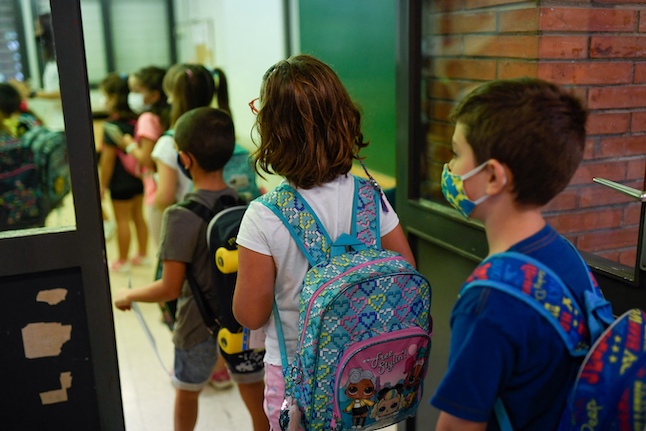
Up until today, students have had to wear masks in the classroom every day. Photo: Josep LAGO / AFP
It's a love/hate relationship Spaniards have with masks
Even after outdoor mask-wearing rules were lifted in Spain, many continued (and still continue) to wear mascarillas outside, whether because they've grown attached to them, they want to make sure they protect themselves and others, or they just think mask wearing isn't such a big deal in the context of a pandemic.
In fact, mask wearing in Spain has become almost robotic and many just wear one all the time without thinking, regardless of what situation they're in. You may see Spaniards wearing masks while hiking in the countryside, far away from others or sitting on a park bench on their own with no one else around.
But apart from this habit becoming ingrained into people’s brains, Spaniards' affinity for mask wearing also symbolises how they have treated the pandemic with more caution than other nations, and that putting others - especially the older generation - before personal freedoms with something as simple as wearing a mask isn't such a tall ask.
Comments (1)
See Also
Since Wednesday April 20th, face masks are no longer mandatory in most indoor public spaces in Spain.
It's a surreal feeling of personal choice for people who live in Spain after 700 days of mandatory face coverings.
Masks have formed part of life in the country since the very beginning of the Covid-19 pandemic, and two years on, they've become an integral part of life in Spain.
READ ALSO: Is Spain ready to get rid of masks indoors?
They were once the most sought-after product in Spain
At the start of the pandemic, masks became the most sought-after products in the country and they were almost impossible to get your hands on. In February 2020, even before the first deaths from Covid-19 demand in pharmacies multiplied by 8,000 and those who searched online found the surgical ones brought from China would take months to arrive. People had to make do with bandanas and rudimentary homemade ones made from cloth material.
Businesses popped up online or through hearsay which saw money-hungry sellers pricing a single mask at €7 or higher.
Masks became so sought-after that people even started producing fake ones. At the beginning of 2021, Spanish police said they seized around four million counterfeit medical-grade face masks at a hotel during a raid in Madrid.
Overall, the average person in Spain has spent €700 on face masks in the last two years, and those who've opted for FFP2 ones, have coughed up €1,515 on average, according to Spanish consumer watchdog OCU.
They’ve changed the way Spaniards greet each other
One of the biggest ways in which masks changed Spanish culture was the way many people started greeting each other. Kissing on each cheek and hugging no longer became socially acceptable for many and masks acted as barriers between people. Spaniards resorted to bumping elbows, simple waves or other ways of greeting instead. People who like their personal space to be respected are now calling for the two-kiss tradition to not return.

They’ve become the standout litter in Spanish streets
Cigarette butts and cans may have been the most common type of litter in Spanish streets a couple of years ago, but nowadays it's masks that ungracefully decorate sidewalks in the country. According to the European Agency for the Environment (AEMA), the environmental and climatic impacts of the increase in disposable masks have been huge. In 2020 alone, at least 1.56 billion masks ended up in the sea.

Forgetting your mask at home became a real pain
Until recently if you accidentally left home without a mask, it could end up being pretty much impossible to do anything. You weren’t allowed on public transport, you couldn't walk into restaurants or shops, or attend any events. In fact, remembering a mask became just as important as making sure sure you have your wallet, keys or mobile when you left the house.
They became a fashion accessory
Masks even became a fashion symbol in Spain, with many ditching the plain blue or black medical masks and opting for material ones emblazoned with funky designs and images. Masks became decorated with everything from cartoon characters for kids to sequins for people heading out on the town and even horror masks with scary clown or Joker faces.
The creative zeal of businesses was so relentless that Spanish authorities had to toughen requirements for the manufacture and sale of face masks, as many masks weren't doing the actual job they were meant for.

They became political and social labels
Not only did masks serve as a fashion statement, they became a political one too. Many across Spain decided to reflect their political affiliations right across their face coverings. Right-wing nationalists wore military green ones with the Spanish flag, while Catalan independentistas (those who want independence) wore ones with the Senyera Catalan flag.
Spaniards also began to label themselves as mask wearers on social media, writing (masked) in brackets after the name. This was particularly common on social platforms such as MeetUp, where people would organise activities to meet new friends.

They became a way of judging others’ behaviour
Throughout the pandemic, Spaniards have - often unknowingly - judged others based on whether they were wearing a mask or not, or even if they were wearing one correctly. For many, not wearing one or having the nose outside of the mask was akin to being socially irresponsible.
When infection rates dropped, TV reports would blame young people and their maskless partying for the rise in cases. In the worst cases, fights broke out on public transport between passengers who reprimanded others for not wearing a mask.
Not wearing one became a crime
Throughout Spain, during the two states of alarm more than 1.3 million fines were imposed and around half of these were for not wearing a mask. The fines ranged between €100 and €6,000. There were also reports of some of Spanish society's most rebellious individuals being arrested for refusing to mask up.

In the summer of 2020, the Andalusian Government even hired 3,000 'informants' to travel its 1,000 kilometres of coastline and denounce bathers who were not wearing a mask, even when they were alone.
They caused young Spaniards to have less face-to-face contact
After exactly 700 days of having to wear a mask indoors in Spain, many young children have spent more than half their lives looking at and interacting with people wearing masks.
According to the hospital group HM Hospitales, the use of masks has caused a 20 percent increase in consultations for children’s speech problems in Spain. Mask rules have also seen an increase in síndrome de la cara vacía or mask-fishing among teens – a phobia or feeling of anxiety by exposing your face and taking off your mask.

It's a love/hate relationship Spaniards have with masks
Even after outdoor mask-wearing rules were lifted in Spain, many continued (and still continue) to wear mascarillas outside, whether because they've grown attached to them, they want to make sure they protect themselves and others, or they just think mask wearing isn't such a big deal in the context of a pandemic.
In fact, mask wearing in Spain has become almost robotic and many just wear one all the time without thinking, regardless of what situation they're in. You may see Spaniards wearing masks while hiking in the countryside, far away from others or sitting on a park bench on their own with no one else around.
But apart from this habit becoming ingrained into people’s brains, Spaniards' affinity for mask wearing also symbolises how they have treated the pandemic with more caution than other nations, and that putting others - especially the older generation - before personal freedoms with something as simple as wearing a mask isn't such a tall ask.
Join the conversation in our comments section below. Share your own views and experience and if you have a question or suggestion for our journalists then email us at [email protected].
Please keep comments civil, constructive and on topic – and make sure to read our terms of use before getting involved.
Please log in here to leave a comment.